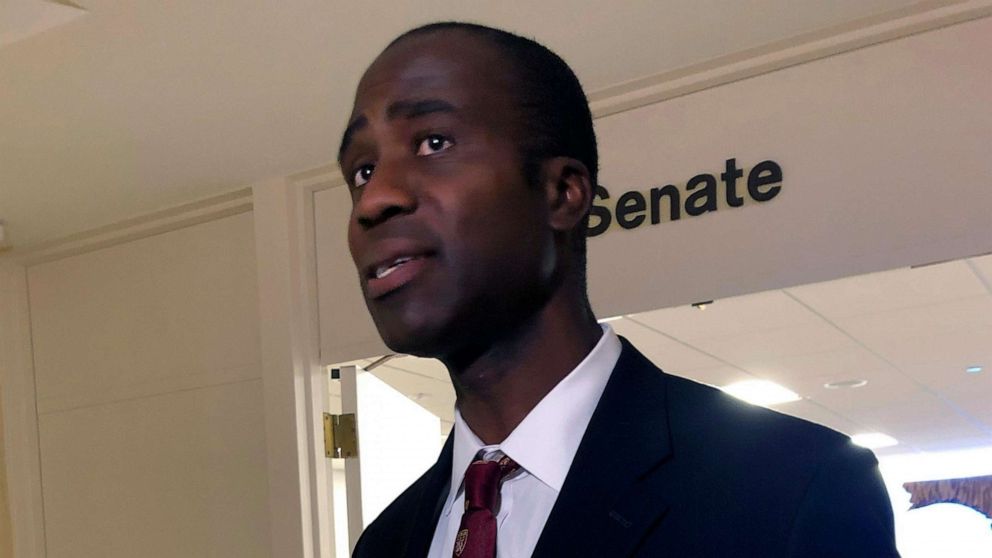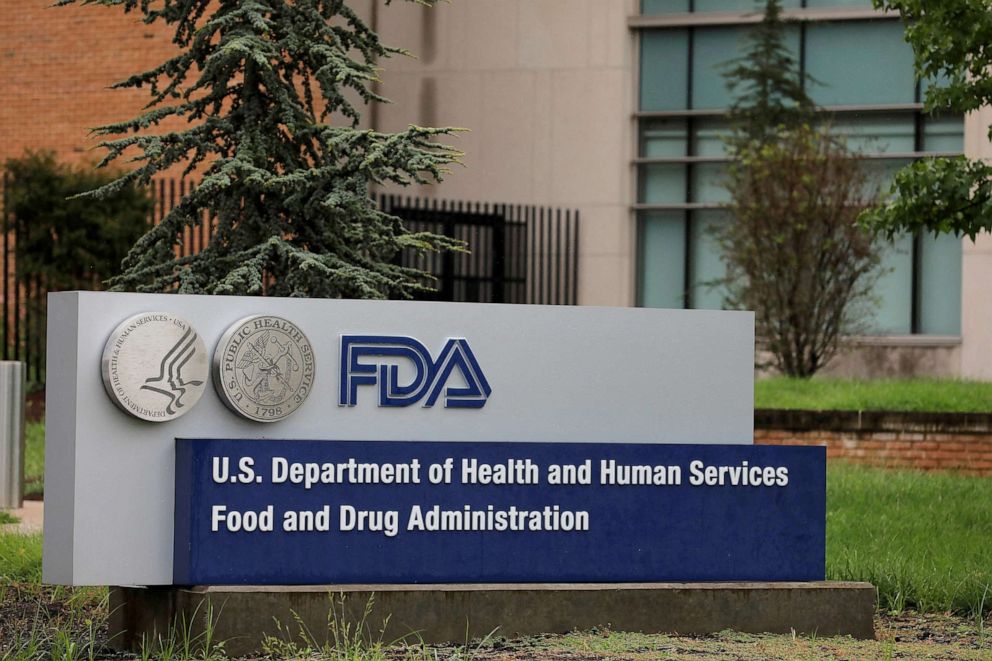The agencies said Joseph Ladapo's claims about COVID vaccines are harmful.
ByMary Kekatos
March 13, 2023

Dr. Joseph Ladapo speaks with reporters after the Florida Senate confirmed his appointment as the state's surgeon general on Feb. 23, 2022, in Tallahassee, Fla.
Brendan Farrington/AP, FILE
Brendan Farrington/AP, FILE
The U.S.Food and Drug Administration and the Centers for Disease Control and Prevention recently sent a letter to Florida's surgeon general debunking his claims about COVID-19 vaccines.
Last month, Dr. Joseph Ladapo had written his own letter to the federal health agencies, saying he was concerned about adverse effects from mRNA COVID-19 vaccines. He claimed there had been an increase in reports made to the CDC's database, the Vaccine Adverse Event Reporting System (VAERS).
In the system, anyone -- be it a healthcare professional or the average citizen -- can report an event they think might have been related to a vaccine they received. It serves as an early warning system for federal health officials to sift through the unverified reports to confirm if an investigation or further action is necessary.
In response, FDA Commissioner Robert Califf and CDC Director Rochelle Walensky said their agencies are constantly monitoring data to see if there are any potential risks -- but added that Ladapo focusing on a rare, minor events can cause misinformation to spread and can undermine public health efforts.
MORE: Scientists pan analysis Florida's surgeon general posted on COVID-19 vaccines
"It is the job of public health officials around the country to protect the lives of the populations they serve, particularly the vulnerable," the FDA and CDC wrote in their letter. "Fueling vaccine hesitancy undermines this effort."
Here is what's in the letter and why an expert says it can be dangerous to fuel vaccine hesitancy:
Last month, Dr. Joseph Ladapo had written his own letter to the federal health agencies, saying he was concerned about adverse effects from mRNA COVID-19 vaccines. He claimed there had been an increase in reports made to the CDC's database, the Vaccine Adverse Event Reporting System (VAERS).
In the system, anyone -- be it a healthcare professional or the average citizen -- can report an event they think might have been related to a vaccine they received. It serves as an early warning system for federal health officials to sift through the unverified reports to confirm if an investigation or further action is necessary.
In response, FDA Commissioner Robert Califf and CDC Director Rochelle Walensky said their agencies are constantly monitoring data to see if there are any potential risks -- but added that Ladapo focusing on a rare, minor events can cause misinformation to spread and can undermine public health efforts.
MORE: Scientists pan analysis Florida's surgeon general posted on COVID-19 vaccines
"It is the job of public health officials around the country to protect the lives of the populations they serve, particularly the vulnerable," the FDA and CDC wrote in their letter. "Fueling vaccine hesitancy undermines this effort."
Here is what's in the letter and why an expert says it can be dangerous to fuel vaccine hesitancy:
"The claim that the increase of VAERS reports of life-threatening conditions reported from Florida and elsewhere represents an increase of risk caused by the COVID-19 vaccines is incorrect, misleading and could be harmful to the American public," the letter states. "Reports of adverse events to VAERS following vaccination do not mean that a vaccine caused the event."
Dr. William Schaffner, a professor of preventive medicine at Vanderbilt University Medical Center, told ABC News the insistence that a report made to VAERS means the vaccines are not safe is a perfect example of correlation without causation.
"The reporting system is the beginning of a series of investigations that then try to assess whether there might be a causal relationship as opposed to a coincidental relationship," he said. "And that's one of the most misunderstood aspects. Just because there's a report in VAERS does not mean that the vaccine caused the event that's reported."
Schaffner explained someone may have a medical event after receiving the vaccine, but that doesn't mean it was triggered by the vaccine at all, rather it just happened to follow. He likened it to a rooster crowing before the sun rises.
"We all know that the rooster crows before the dawn, but we don't think that the rooster made the sun come up," he said. "So that was coincidence. How do we distinguish coincidence from causality? Because we know if we silence the rooster, the sun will come up anyway."
MORE: DeSantis calls for permanent ban on COVID mask and vaccine mandates. Here's what that means
Schaffner said that the fact VAERS exist, and people can make those reports is evidence that federal officials are being transparent, not that there is anything to hide.
He added that people can tune into meetings of the CDC's Advisory Committee on Immunization Practice to hear the data "presented very carefully, with the proviso that we're going to present the various data and then show you how we have further analyzed the data and done further investigations to address various issues of vaccine safety."
In October 2022, Ladapo recommended against men between ages 18 and 30 receiving the COVID-19 mRNA vaccines due to a "modestly increased" risk of cardiac-related deaths in an analysis posted online. The study was widely criticized by the medical and scientific community due to its poor methodology and never having to go through the rigorous standards of peer-review.
The agencies wrote in their letter that cardiovascular experts found the risk of strokes and heart attacks was lower in people who were vaccinated against COVID-19, not higher.
signature threshold
Last year, Ladapo also formally recommended against COVID-19 vaccinations for healthy children.
However, multiple peer-reviewed studies, listed in the letter, show that the risk of death, serious illness and hospitalization is higher for unvaccinated people in all age groups.
According to the agencies' most recent estimates, also shared in the letter, those with the updated, bivalent booster had a 9.8-fold lower risk of dying from COVID-19 than unvaccinated people.
Additionally, they were estimated to be 2.4 times less likely to die from COVID-19 than those who are vaccinated but have not received the updated shot.
MORE: Florida's decision not to preorder vaccines for young children will create access issues: White House
"COVID continues to be one of the 10 leading causes of death," Schaffner said. "We can keep two thoughts in our mind at the same time. Yes, it is true that children are less seriously affected than, for example, senior citizens."
He continued, "However, although they are less affected, it doesn't mean they're unaffected. Indeed, they are infected severely enough."
Schaffner advised parents who are concerned to directly speak to their children's pediatricians about the COVID-19 vaccines.
"Speak to the physician in whom you do have confidence and trust the person who has been there for you and your children in the past and is there for them now, and will be in the future," he said.

Sign is seen outside of the Food and Drug Administration (FDA) headquarters in White Oak, Md., Aug. 29, 2020.
Andrew Kelly/Reuters, FILE
In a statement to ABC News, the Florida Department of Health blasted back against the federal agencies and claimed the letter is not truthful.
"The response from the federal government is just another redundant display of the same apathetic talking point of 'safe and effective,'" a spokesperson said in a statement. "Googling their fact sheets would have achieved the same result. While the Feds gaslight the American public, Florida pushes for the truth."
The statement continued, "Three inquiries remain unanswered: 1. Access to raw patient-level data to allow for unbiased research. 2. Adequate attention surrounding the risks detected by numerous researchers around the world. 3. Public transparency from the CDC, FDA, and Big Pharma."
No comments:
Post a Comment